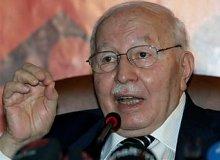Turkey holds massive funeral for ex-Islamic PM

ANKARA – Huge throngs of mourners converged on a mosque Tuesday for the funeral of a former prime minister who laid the roots of political Islam in modern Turkey and inspired the current government in its struggle against military-backed secular circles, AP reported.
The coffin of Necmettin Erbakan, draped in a green, Islamic shroud, was surrounded by crowds that sought to touch it, and tributes to this pious figure, who died Sunday of heart failure at the age of 85, poured in from around the country and the world. The Palestinian militant group Hamas expressed sorrow, and Turkey's prime minister, Recep Tayyip Erdogan, cut short a European trip to attend the funeral.
"God is Great!" the mourners chanted at the Ottoman-era Fatih mosque in Istanbul, which was first built in the 15th century and rebuilt several times after earthquake damage. As many as 200,000 attended, though police did not provide a crowd estimate.
Attendants included men with Islamic cloaks and turbans as well as academicians, Cabinet ministers and even a few military officers in khaki uniforms. Erbakan's demise was announced from minarets of around 3,000 mosques in Istanbul — a practice usually limited to the mosque where prayers are being held.
Erbakan, a jovial, stocky figure who sported bright Versace ties, served only a year as prime minister before being pressured by the fiercely secular military to step down in 1997, but he never dropped his interest in politics despite deteriorating health. Aides said he was working on a possible election alliance between his Felicity Party and other small pro-Islamic parties before his death.
His wit endeared him even to political opponents. He was affectionately known as "Hodja," or "Teacher," by his followers and former members of his banned Welfare Party, including Erdogan, President Abdullah Gul and other proteges.
Erbakan won election in 1995 on a campaign to build closer ties with the Islamic world, and visited Iran and Libya. His meeting with Libyan leader Moammar Gadhafi, now besieged by rebels, turned into a diplomatic disaster when Gadhafi criticized Turkey for cracking down on autonomy-seeking Kurdish rebels and having close ties with the West.
A shocked Erbakan said: "We don't have a Kurdish problem, we have a terrorism problem," to save face in front of dozens of Turkish journalists accompanying him to Libya.
Erdogan, whose ruling Justice and Development Party had spun off from Erbakan's outlawed movement, returned from a trip to Germany for the funeral, canceling a stop in Brussels.
Hamas Prime Minister Ismail Haniyeh expressed the "deep sorrow" of Palestinians in a message to Turkish leaders, and said Erbakan was an "important figure."
Erdogan's Justice and Development Party, now in its second term, is the front-runner ahead of national elections in June. While inspired by Erbakan's overtly Islamic doctrine, Erdogan's government chose a more moderate path. It has campaigned for membership in the European Union and pledged allegiance to the secular constitution, despite the suspicions of opponents that it is plotting to impose Islam on society.
In doing so, it kept an uneasy peace with the powerful secular establishment in its critical early years in power, though the government, buoyed by strong electoral results, later took robust action to dismantle the political clout of the military.
Erdogan has burnished his Islamic credentials by his backing of Palestinians against Israel, once a strategic military ally, and seeking stronger alliances with Iran and other Muslim countries, to some consternation among Turkey's Western allies.
In the Erbakan era in the 1990s, the Turkish military signed agreements with Israel that allowed Israeli pilots to train in Turkish air space and its military to hold joint drills with the Turkish navy in the Mediterranean. But Israel's deadly raid on a Gaza-bound Turkish aid ship that left nine Turks dead last year signaled how far the relationship between the two countries has deteriorated.
As prime minister, Erbakan also drew the wrath of the military, the self-appointed guardian of Turkey's secular traditions, with his moves to allow female civil servants to wear Islamic attire at work and to rearrange working hours to fit fasting times in the holy month of Ramadan. He resigned in June 1997 to appease the military, which has staged three coups since 1960.
After he quit, Erbakan was barred from politics for five years and also convicted of falsifying party records and hiding millions in cash reserves that were earmarked for confiscation after his party's closure in 1998. He was elected as head of the small Felicity Party as soon as his political ban ended in 2003.
While Erbakan lost the power struggle against his secular opponents in the 1990s, his political successors have since gained the upper hand. Today, hundreds of military generals and officers stand accused of conspiring to overthrow Erdogan's government in 2003, underlining the willingness of Turkey's civilian leaders to challenge generals, who say the charges against them are based on flimsy evidence.
Erbakan challenged the military even before coming to power, saying in parliament in 1994: "We'll come to power no matter what, but will the transition be soft or bloody?"
The remarks were interpreted by prosecutors as a hint that his party could stage an armed uprising, but charges were later dropped.
Here we are to serve you with news right now. It does not cost much, but worth your attention.
Choose to support open, independent, quality journalism and subscribe on a monthly basis.
By subscribing to our online newspaper, you can have full digital access to all news, analysis, and much more.
You can also follow AzerNEWS on Twitter @AzerNewsAz or Facebook @AzerNewsNewspaper
Thank you!
